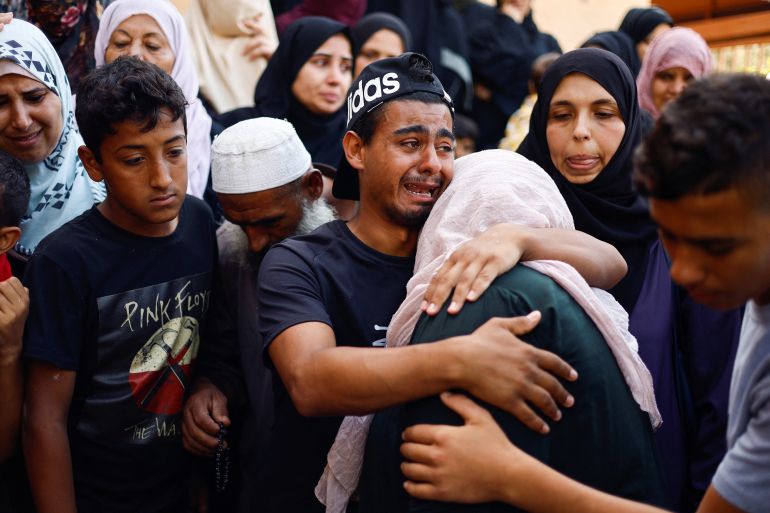Macron says protecting civilians ‘non-negotiable’ at Gaza aid conference
French president called for a humanitarian pause quickly: ‘The situation is serious and getting worse each day’.

French President Emmanuel Macron has called for a humanitarian pause in fighting between Israel and Palestinian groups in Gaza, saying that Israel must take steps to avoid civilian casualties.
Speaking at a conference on aid for Gaza in Paris on Thursday, Macron said that fighting terrorism cannot be conducted “without rules” as Israel pummels the strip with air raids that the Gaza Health Ministry says have killed 10,812 Palestinians, including more than 4,400 children, since October 7.
Keep reading
list of 4 itemsMore than 1,000 USAID employees sign letter backing Israel-Gaza ceasefire
Gaza children displaced by Israel’s war cling to toys in al-Shifa Hospital
Photos: From New York to Karachi, protesters rally in support of Palestine
“The situation is serious and getting worse each day. We need a humanitarian pause very quickly and [a] push for a ceasefire,” said Macron, stressing that protecting civilians is “non-negotiable”.
The conference brought together dozens of countries, international organisations, and aid agencies to discuss dire humanitarian conditions in Gaza, and proposals for a humanitarian maritime corridor, field hospitals, and financial assistance were discussed as an Israeli siege cuts off access to food, electricity, and fuel for Gaza’s more than 2.3 million residents.
Egyptian Foreign Minister Sameh Shoukry said that such steps “far exceeds the right to self-defence” and accused Israel of “violations of international humanitarian law”.
Representatives from several Arab nations, including Palestinian Authority Prime Minister Mohammad Shtayyeh, attended the conference, alongside UN officials and representatives of Western countries, although few heads of state or foreign ministers were present.
“How many Palestinians must be killed for the war to stop,” Shtayyeh asked. “Is killing 10,000 people in 30 days enough?”
As Israeli attacks displace more than 70 percent of Gaza’s population and overwhelm the strip’s fragile health system, a small trickle of humanitarian assistance has been allowed to enter through the Rafah crossing with Egypt. But those deliveries are not nearly enough to alleviate the dire humanitarian situation, which has been pushed to breaking point.
Philippe Lazzarini, head of the UN agency for Palestinian refugees (UNRWA), urged that all crossings into Gaza should be opened.
“We cannot wait a minute more for a humanitarian ceasefire or lifting of siege which is collective punishment,” added Jan Egeland, the secretary-general of the Norwegian Refugee Council.
“Without a ceasefire, lifting of siege and indiscriminate bombarding and warfare, the haemorrhage of human lives will continue,” he said in comments echoed by the United Nations and the International Red Cross.
Financial aid
More than 1.5 million people have fled their homes, and an estimated $1.2bn is needed to respond to the crisis in the Palestinian territory.
Cyprus President Nikos Christodoulides’s plan for a humanitarian sea corridor to Gaza aimed for a “sustained, secure high-volume flow of humanitarian assistance to Gaza in the immediate, medium and long term”, he said.
French officials said they were also considering evacuating injured people onto hospital ships in the Mediterranean Sea, off the Gaza coast. Paris sent a helicopter carrier off the Cyprus coast and was preparing another with medical capacities on board.
French help
France has already provided an additional 20 million euros ($21.4m) in humanitarian aid for Gaza through the United Nations and other partners since the war broke out on October 7 and sent 54 tonnes of aid supplies via three flights to Egypt.
On Tuesday, the German government said it will provide 20 million euros in new funding, in addition to releasing 71 million euros ($75.9m) already earmarked for UNRWA following a review it launched after the Hamas attack.
European Council President Charles Michel and European Commission President Ursula von der Leyen were also attending the conference.
The 27-nation bloc is the world’s top aid supplier to the Palestinians. It has sent almost 78 million euros ($83.4m) this year.
Israel was not participating in the conference, and has opposed calls for a ceasefire without all the captives taken by Hamas being released.